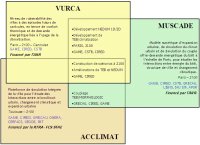To answer to the climate change climatic challenge, all the States have to reduce their greenhouse gas emissions, but also to take measures of adaptation to limit the negative impacts of the global warming on the population, the economy and the environment.
The question settles particularly on the scale of the city, which presents a strong concentration of the populations and the economic activities, in constant evolution and increase, as well as a strong sensibility to the climate change, due to the density and to the city structure which generates the urban island of heat.
Research projects to study interaction between cities and climate change, with numerical models.

Several interdisciplinary projects have been launched in order to provide tools and first insights into the set of all the components concerned in the interaction between climate change, city structures and economies. Adaptation strategies will be studied all along these projects.
- Evaluate the level of urban structure vulnerability (in terms of comfort losses ) and energy demand sensitivity (in terms of air cooling) due to heat waves, and evaluate potential adaptation strategies : VURCA project
- Study three items involved into city sustainable development : energy, city structure, and climate change, on Paris urban area, at the XXIst century time scale : MUSCADE project
- Develop a numerical modeling framework to study urban development, urban micro-climate, and climate change process interactions, on Toulouse urban area : ACCLIMAT project.

Different goals and numerous similarities
Although directed to very different objectives, these projects present certain number of common points (theme, tasks, partners, targets), which brought the partners to closely work together through these 3 projects.
Common working groups, expertise sharing, and consistent recruitments allow to optimize the projects while creating a relevant scientific dynamics on the theme “modeling of the city and the climate change”.
|